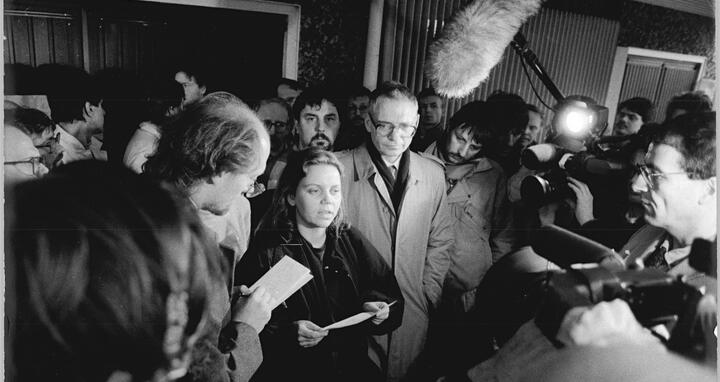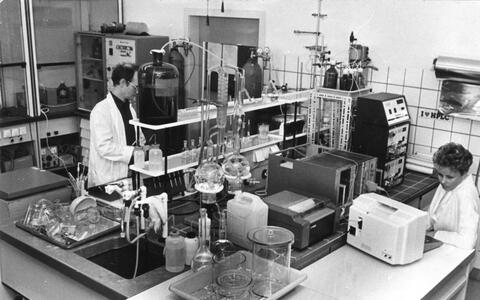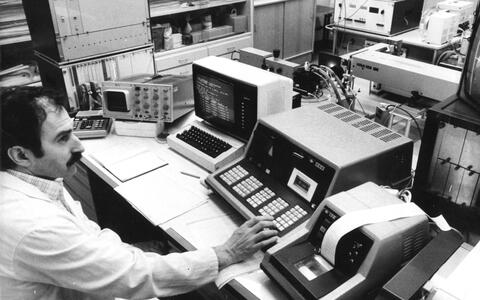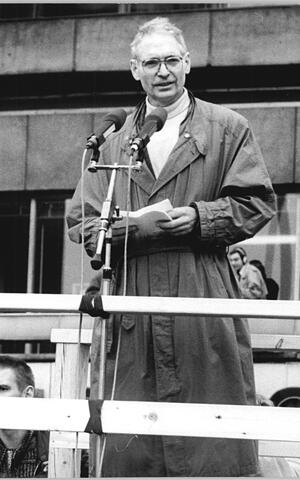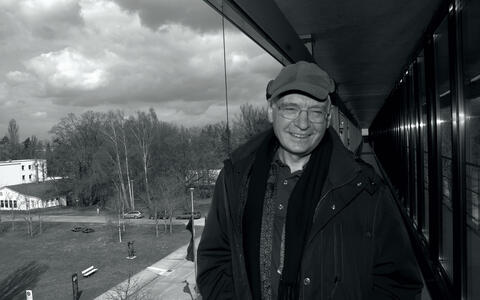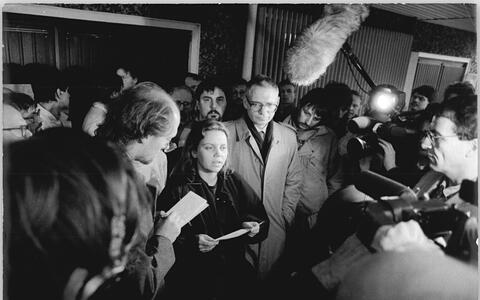“Renewal was essential”
You have not just been associated with MDC for the last 25 years, but for almost 25 years before that. What hasn’t changed?
The feel of life on campus – for example, the fact that districts like Schwanebeck, Karow or Buch are home to many members of staff who are not peripatetic scientists. Drivers, gardeners, secretarial staff and those maintaining our technical infrastructure. Most of them are home grown. And that hasn’t changed.
It used to be the case with the scientific staff, too. Jobs were tenured, groups largely grew old together. The sense of family was more pronounced. We lived here, our children went to the kindergarten on campus. There was plenty of interaction, with the hospitals as well. Gossips had a field day!
Today, you can easily separate the mobile from the immobile – in every sense. It’s true of society as a whole. There are migratory birds and sedentary species. The scientists concentrate on their external output, at international conferences, in publications. Many young researchers lead the life of a water flea so as not to get left behind. Water fleas sink when they stop moving, then they struggle to climb up again.
For scientists, the migratory bird lifestyle does have its advantages.
Biochemical lab at the Central Institute for Molecular Biology.
Recently, an article was published in Nature that linked the quality of science with the mobility of the institution in recruiting nationally and internationally. That was exactly what we missed so much. That was why I was so dissatisfied in the GDR.
For a long time, the Academy of Sciences was a saving grace, politically. At least you could breathe there, there was still some awareness of the world beyond. But academic exchange was largely the privilege of the elite travel squad. Your ordinary scientist hardly got a look in at all. At most, we were drawn in when important visitors came from places like the United Kingdom. There was nothing relaxed about it. And there was very little of it. It was a serious disadvantage for science.
Was science successful in the GDR despite the circumstances?
On that, there is a scientific study that makes two important points: From 1945 to 1990, efforts were made to build a beacon of science for the GDR here. To become world class. The book tells the sad story of how the planning management failed all along the line. Everything dissolved in the cockfights between the Ministry for Science and Technology, the SED Central Committee’s Department of Science, the Council for Medicine in the Ministry of Health and so on. It makes awful reading if that is how you spent your scientific career. The other aspect is all the things that were cultivated and nurtured on the little plots of scientific land beneath the turmoil of the upper floor. That makes one quite sentimental.
What else was missing?
The first complaint was that we couldn’t share our ideas with the rest of the world. The second was the lack of chemicals for testing. Today, you just send round an e-mail and someone on campus will have what you need in their cupboard. Then, people used to import things in their “pants pockets”, as it was known, and we could be thankful if the border police in their ignorance didn’t break open the seals on the chemicals. Then there were the issues with measuring technology. It was difficult to keep large-scale apparatus running. Some spare part or other was always missing; the GDR hardly developed any research technology at all, except for the Soviet space program. Even the Zeiss spectrometers were antiquated.
We modeled biological systems using partial differential equations. People in the West had stopped doing that in the 1970s. There they put their money on brute force, ever faster computers and bigger storage capability. We despised them for just relying on a machine. The intellectual bonds between East and West were slowly being wrenched apart.
Why did you stay in the GDR?
You would have had to drive me away. There was the family, all my friends. There was the “Friday Circle”, the opening up in the Eastern Block where I was able to build a very good ersatz life, both professionally and privately. The Solidarność dissidents stayed at our apartment on their way from Warsaw to the West, for example. Of course, the Stasi found out about these friendships; politically, I had quite a bit of bother. But it didn’t drive me away.
The consequence of staying was that our science was reduced to tilling a tame little plot of land. Inescapably. Everyone complained about it and knew it and lived with it. A few did leave – every time involving a huge scandal – because they couldn’t stand it any longer.
Biophysical lab at the Central Institute for Molecular Biology.
Because of your engagement in the civil rights movement you were sidelined. For many, you are a model of how to demonstrate backbone.
Political analysis of the entire system became more important to me than analyzing the human genome. Also, I had the feeling the family would break apart. My daughter had left, and the younger ones were veering in the same direction. They didn’t want to live like us. So, we started thinking about internal reforms.
The other trigger was the threatening economic and ecological collapse. In the Soviet Union, it was dramatically clear where that was leading – think of the Aral Sea. It took them just 25 years to dry out one of the largest lakes in the world. Then came the war in Afghanistan. It was obvious that this country was heading for disaster.
It didn’t matter to me that I had been relieved of my functions and no longer had security clearance. I sat down with my little GDR computer and was able to do some of my own research. It was the end of my academic career. But all the other things, the opposition groups, were more interesting and lively.
Were a lot of people at Buch in the same situation?
Jens Reich was one of the speakers at the demonstration in Berlin’s Alexanderplatz on November 4, 1989.
I find it difficult to evoke the revolutionary spirit of Buch. Until the Wall was opened up and the controls were eased, I was a spare-time member of the opposition. I had to be punctual, not violate my contract. Colleagues would avoid me on campus. So, in 1989, I sat here and pondered, phoned people and wrote pamphlets. That worked, nobody wanted anything from me. I was a persona non grata. Many people only realized later that you did have freedoms because those in power were tired.
This awakening out of compliance with servitude happened very slowly at Buch. Here, for example, they had a vote of no confidence in the heads of the two hospitals – that was something! But it was long after the Wall came down. Then the feud broke out about Stasi involvement. The revolution initially came from outside, from the mass demonstrations in the city center.
What gave you the courage to take the microphone at the Alexanderplatz on 4th November?
The enormous crowds of people had actually made me rather uneasy. I don’t know whether it’s always like that when you stand in front of such a huge number of people, but are still looking into faces that are shouting out loud. And then you have to speak yourself.
If you were a speaker you had to get up on the back of a truck; you couldn’t see anything before that. Everything round about was draped in sheets, a barrier against the people who were cheering, roaring, whistling and clapping on the other side. We stood behind it and everyone looked at each other suspiciously. There was a little café, Christa Wolf and an ill-tempered Heiner Müller were sitting there. Günter Schabowski and Markus Wolf. A combination one could hardly imagine. The organizer was completely stressed out in case the police decided to intervene after all. He made sure everyone kept to their allotted time slot. Militarily.
Then you go up the stairs and you’re suddenly standing there and there are heads as far as the eye can see. In every direction. What I didn’t realize was that the atmosphere on the square was so positive. My family only told me about it later. It was as though they were all intoxicated! The carnival atmosphere, the liberation, I hadn’t noticed any of it. At the front there were Stasi plants. They gave us a nasty heckling and made you feel as though something was weighing heavily on your heart.
Mass rally at Berlin Alexanderplatz on November 4, 1989, when several hundreds of thousands people demonstrated for a democratic renewal of the GDR.
What happened subsequently at what became MDC?
It was a time of waiting for the future, of complete uncertainty. Detlev Ganten, the founding director, said it was amazing what had gone on here! The tradition, the spirit should be revived! He made fiery speeches. Lecturers started to hope again.
Most of the academic staff wrote applications, they wanted funding to go abroad or to work for companies. The younger ones went away; the middle-aged ones had a tough time. The whole issue of Bonn- and Brussels-speak! I was sub-literate. Of course, we could speak English and had read our stuff. But we didn’t know the right jargon for our applications. Only a few groups managed to survive.
Renewal was essential, not least because the topics had changed. For example, one very good group was working on ways of getting round the patent on the genetic production of insulin in order to acquire the substance for the population of the GDR and the Eastern Block. These efforts had to be stopped.
No easy task for Detlev Ganten.
The institute was built on the foundations of what was already there. Ganten didn’t want to make a tabula rasa, but rather to try and retain everything that was worth preserving. With the appointment of Helmut Kettenmann, Walter Birchmeier and others from 1993/94, the pioneering departments came along, establishing themselves in new areas. Among the autochthonous, there was initially considerable resentment. Ganten nevertheless ploughed on with the attempt to fit the frames to the ship, to find the brackets. The topic everyone had in common was “molecular medicine”. It took a while before it all grew together. Today, we are a medicine-oriented and highly successful basic research institute.
At the same time, science and medicine was changing.
We entered the scene at the height of sequencing. My department, for instance, took part in the human genome project. We didn’t actually do any sequencing at the time, but we were involved in putting together and identifying characteristic patterns. That was not a given. At the beginning, there were people who thought nothing would come of the human genome project in the first place.
Basically, it was a second revolution. Was it a turning point for MDC?
We experienced and shaped the coming together of cell biology and molecular biology. At Buch, for many decades, genetics and biochemistry lived parallel lives. Even Timoféeff with his fruit flies and Negelein with his enzymes had nothing to do with one another. But in the last 15 or 20 years, the biology of the cell and biochemistry with its branch of genomics and genetics have amalgamated. Today, it’s taken for granted.
I veered away from purely abstract molecular biology to cell biology. Others moved from cell biology in the opposite direction. This was one of the institute’s achievements: thinking in terms of cell biology, which is, of course, the basis for investigating disease, as the foundation, underpinned by genetics and, more recently, epigenetics.
Jens Reich
What, in your opinion, is the most pressing bioethical issue?
I’m concerned about intervening in the genome of unborn beings. The justification for it is to avoid detrimental mutations like hemophilia, Huntington’s and so on. At the moment, an attempt is being made to establish limits, on technical, not moral grounds. Let’s imagine that Crispr-Cas9 means there are no more off-target effects. Why should I repair the Huntington gene in one patient and, at the same time, take the decision that his children have to retain the original mutation because the germ line mustn’t be changed? The germ line will lose its nimbus of being unalterable.
In the media, the topic is a dystopic fantasy, but what if we were able to extend life through genetic surgery? If we could make anopheles mosquitos stop biting humans? What would this world look like? How dangerous is it? But, also, how wonderful! You can’t just leave this conversation to the bioethicists. Biomedical science should take much more of a stand on these matters, pull on its coat and go out into the cold. In cities like Berlin there are certainly people – film-makers, writers and other artists – with whom one could talk about the issues. Not doomsday scenarios but “What sort of future will it be?”
What would you wish MDC for the next 25 years?
Well, that’s easy! Someone has to get a Nobel Prize. But given our mission, we really shouldn’t just attempt to win a Nobel Prize in our basic research areas, as marvellous as that would be. The aim is a genuine breakthrough in a widespread disease like Alzheimer’s. That should be possible – and that really would be something!
The questions were asked by Jana Schlütter.
Professor Jens Reich has worked at Berlin-Buch since 1968. From 1992 until he became emeritus in 2004, he was leader of MDC’s research group on medical genomics; today, he is an ombudsman. In the 1980s, Jens Reich was active in the civil rights movement in the GDR and, in 1989/90, was a co-founder of the “New Forum”. In 1994, he stood as an independent candidate for the office of Federal President and, from 2001 to 2012, was a member of the German Ethics Council.
Jens Reich and Margitta Hinze at a press conference in 1990. Photo: Federal Archives

